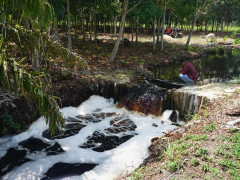Challenges in Restoring Peat Ecosystems in Concession Areas
By Pantau GambutOmnibus Law Threatens Peat Protection Efforts
Peatland topography has its own set of characteristics which requires specific protection efforts. South Sumatra has approximately 1.7 hectares (ha) of peatland.
Considering the size of the area, the government and stakeholders play a role in the conservation and protection efforts. The key is strict law enforcement.
The spirit of strict law enforcement as part of the peatland protection effort will certainly clash with the regulations currently being discussed in the House of Representatives (DPR RI), namely the Omnibus Law. The draft legal product (Omnibus Law) provides a new loophole in law enforcement, especially for companies holding concession rights in the peatland area. The companies will easily relinquish their responsibility because they are only threatened with an administrative penalty.
Based on the experience from last year’s Forest and Land Fires in South Sumatra, some companies should be held accountable for the incident. However, the Ministry of Environment and Forestry (MoEF) has not taken firm action and no company permits have been revoked.
The land and forest fires in South Sumatra last year affected more areas compared to the last three years. In 2019, the total burned area in South Sumatra (based on MoEF data) was 336,798 ha. This was half of the burned land area in 2015 (646,298.8 ha). Afterward, the total burned area was 8,784.91 ha in 2016, 3,625.66 ha in 2017, and 16,226.60 ha in 2018.
This will worsen if the drafted law provides more lenient penalties against forest and land fires for perpetrators, especially for peatland fires.
The Omnibus Law will provide flexibility for corporate responsibility in the protection of peat areas. Merely imposing an administrative penalty on these companies opens up more space for non-compliance in the protection of peat areas.
As a comparison, these companies ignored the implementation of the Environmental Law which requires them to take responsibility for environmental damage. This will worsen once the Omnibus Law has been ratified.
On the other hand, the draft Omnibus Law greatly affected environmental protection, for example, compliance with the Environmental Impact Analysis (AMDAL) permit. The policy of eliminating AMDAL for the sake of investment projects also poses a threat to peat protection efforts. Bearing in mind that peat protection efforts must be carried out based on an understanding of the landscape. Having an understanding of the landscape will create a more comprehensive peat protection effort.
For example, when the government tries to restore damaged peat in non-concession areas, this will affect the surrounding peat conditions. If a company holds a concession permit for an area in the damaged peat landscape, a complete restoration will be required.
The draft Omnibus Law, which prioritizes ease of investment also emphasizes the central government’s authority to cancel legal policies such as spatial and regional planning in the province. This kind of authority, in the hands of the central government, also threatens peat protection efforts on the grounds of investment interests.
Therefore, the peat protection effort, especially in South Sumatra, should prioritize stricter law enforcement efforts, from both the local and central governments.
Based on the peat protection efforts, the concession land located in the peat area should be reviewed and restored by the company. Unfortunately, efforts to protect the peatlands, especially in the company concession areas have not been monitored, especially by the public. The solution is to carry out recovery measures in reviewing the damaged peat areas.
This opinion was conveyed by the Executive Director of Walhi South Sumatra and Coordinator of Simpul Jaringan Pantau Gambut - South Sumatra, Hairul Sobri.
THIS WRITING WAS PREVIOUSLY PUBLISHED ON GATRA.COM, ON 27 MARCH 2020




